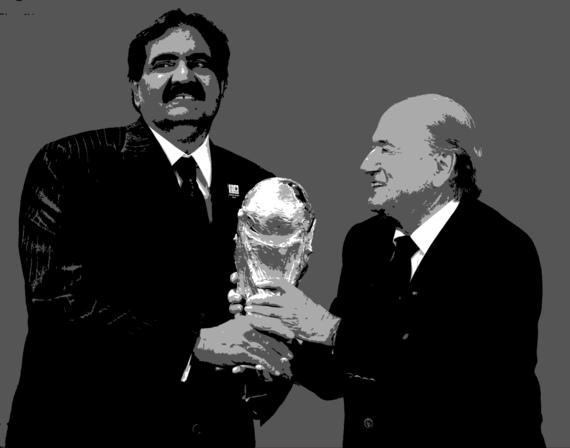Whilst unfortunate, it is certainly not surprising that this is the second consecutive World Cup where only one Arab football team -- Algeria -- managed to qualify. While most Arabs probably wish the Algerian team the best of luck, very few of us expect them to deliver miracles in Brazil.
Yet, as the world turns its attention towards Sao Paul, the Arab failure in regularly reaching, let alone ever winning, this championship is something worth reflecting upon.
The fact is, sport cannot be separated from what goes on in a particular society and how this society's institutions function. As such, there is no reason for a nation to perform well in football when it is suffering from an institutional failure in every other sector.
This is probably the scenario in many footballing nations which were affected by the Arab Spring, such as Tunisia and Egypt, and one hopes they will soon recover their athletic glory once the overall situation is stable and secure in their respective societies.
Meanwhile, it is the absence of the more stable Gulf countries, renowned for their feverish fondness of football, which raises several questions, particularly as most Gulf nations have a vast amount of resources and are able to provide the infrastructure and facilities for their players to enable them to compete at an international level.
Actually, it is just embarrassing that the national teams of countries such as the UAE, Saudi Arabia and Qatar didn't qualify for Brazil 2014, while these countries, or representatives of them, own some of the biggest and most successful European football clubs.
Of course, football has never been a "rich person" only sport -- quite the contrary actually -- and it will certainly be naive of our football officials to think that this sport can be developed just by throwing money at it. If this were so, we would have never seen a poor country excel in football or make it to the World Cup.
Having said that, while spending on improving sports infrastructure may certainly help improve facilities, acquire experience and talent, the real issue is most likely that many of us believe it to have a "magic pill" effect, whereby results are guaranteed immediately. Obviously, this is not the case.
Positive Steps
However, there are some positive signs that Gulf football might be headed in the right direction. In Saudi Arabia, where the responsibility of developing the sport is entrusted to the head of the Saudi Arabian Football Federation (SAFF), an interesting development has occurred recently as it was decided that the president of SAFF is no longer appointed, but is to be elected.
This means that what was once an honorary position filled by a member of the Royal Family, who is not necessarily an athlete or a footballer himself, can now be up for grabs by the most suitable candidate and that this candidate can be held accountable for the success or failure of the national team.
What also needs to be done in Gulf countries is to encourage international transfers of the local players to help them gain additional skills and experience. Of course, we must first accept and admit that not all our players are going to be accepted at first row international football clubs. However, it goes without saying that we should start from somewhere!
What is also a given is that we need to exploit our ownership of some of the biggest European football clubs to develop serious and rigid scholarship programs for our players, managers and coaches whereby they can shadow and gain experience from their international counterparts.
Another thing that can be introduced is finding ways to encourage the best local talent to take up sport as a career. For this to happen, it will require an abolition of any "wasta" (preferential treatment) when it comes to scouting, hiring, training or disciplining football players.
Also, we could take into consideration some of the best practices globally when it comes to encouraging athletic careers, such as the American model where sport is considered a serious industry rather than just a mere pastime. In the U.S., scouts search for young talent from an early age, and then the selected candidates are offered academic scholarships and an integrated nurturing and training program that guarantees them a decent life as these amateurs develop into professional players.
Qatar 2022: From Success to Scandal
Going back to the World Cup and the Arabs' failures, it is also additionally embarrassing that our capability -- as Arabs -- to dominate newspaper headlines is confined to accusations based on recently leaked documents and letters showing that Qatar paid large sums of money to secure the honor of hosting the World Cup in 2022.
If proven, such accusations are not only going to turn what was perhaps the only Arab success into a scandal, but it will certainly be damaging to the reputation of not only Qatar, but Arabs in general, given that they reinforce a negative stereotype that we -- as Arabs -- can't win unless a victory is secured through our money.
*This article was first published in Al Arabiya News on June 12, 2014.

